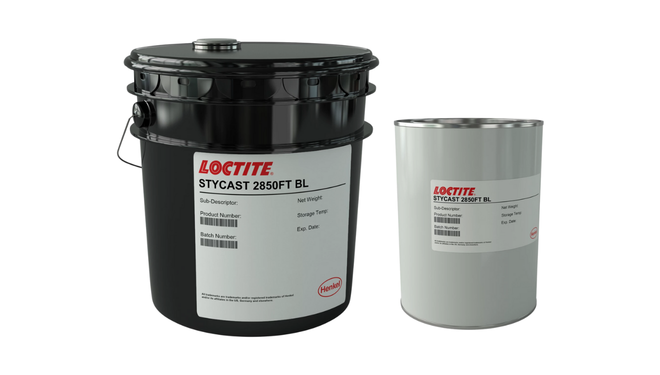LOCTITE STYCAST 2850FT
Harmonization Code : 3907.30.00.85 | Polyacetals, other polyethers and epoxide resins, in primary forms; polycarbonates, alkyd resins, polyallyl esters and other polyesters, in primary forms : Epoxide resins : Other
Main features
- Thermally conductive
- Low CTE
- Used with various catalysts
Product Description
LOCTITE® STYCAST 2850FT is a black, thermally conductive epoxy encapsulant recommended for encapsulation of components that require heat dissipation and thermal shock properties. This PCB coating is also available in the unpigmented version.
LOCTITE® STYCAST 2850FT can be used with catalysts LOCTITE CAT 9, LOCTITE CAT 11, LOCTITE CAT 23LV or LOCTITE CAT 24LV which change its characteristics.
The following specifications are for the combination with CAT 9. Please consult the TDS for the cured properties of each catalyst mixture.
Technical Specifications
| Thermal Properties | |
| Glass Transition Temperature (Tg) Glass Transition Temperature (Tg) The glass transition temperature for organic adhesives is a temperature region where the polymers change from glassy and brittle to soft and rubbery. Increasing the temperature further continues the softening process as the viscosity drops too. Temperatures between the glass transition temperature and below the decomposition point of the adhesive are the best region for bonding. The glass-transition temperature Tg of a material characterizes the range of temperatures over which this glass transition occurs. | 86 °C |
| Thermal Conductivity Thermal Conductivity Thermal conductivity describes the ability of a material to conduct heat. It is required by power packages in order to dissipate heat and maintain stable electrical performance. Thermal conductivity units are [W/(m K)] in the SI system and [Btu/(hr ft °F)] in the Imperial system. | 1.25 W/m.K |
| Chemical Properties | |
| Water Absorption | 0.03 % |
| Physical Properties | |
| Viscosity Viscosity Viscosity is a measurement of a fluid’s resistance to flow. Viscosity is commonly measured in centiPoise (cP). One cP is defined as the viscosity of water and all other viscosities are derived from this base. MPa is another common unit with a 1:1 conversion to cP. A product like honey would have a much higher viscosity -around 10,000 cPs- compared to water. As a result, honey would flow much slower out of a tipped glass than water would. The viscosity of a material can be decreased with an increase in temperature in order to better suit an application | 250,000 mPa.s |
Additional Information
Cure Schedule
With LOCTITE CAT 9
- 16 to 24 hours @ 25°C
- 4 to 6 hours @ 45°C
- 1 to 2 hours @ 65°C
With LOCTITE CAT 11
- 8 to 16 hours @ 80°C
- 2 to 4 hours @ 100°C
- 30 to 60 minutes @ 120°C
With LOCTITE CAT 23LV
- 16 to 24 hours @ 25°C
- 4 to 6 hours @ 45°C
- 2 to 4 hours @ 65°C
With LOCTITE CAT 24LV
- 8 to 16 hours @ 25°C
- 4 to 6 hours @ 45°C
- 2 hours @ 65°C
With LOCTITE CAT 27-1
- 4 hours @ 120°C



